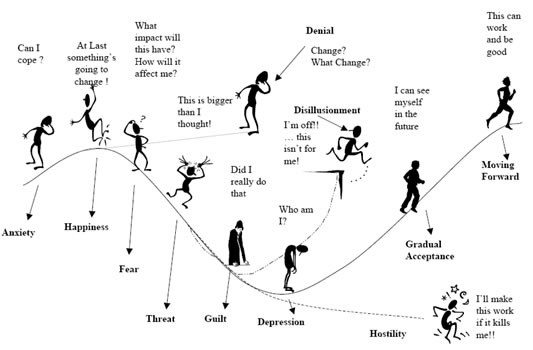Over the past two years we have all had to come to terms with a lot of change, and transitioning into new ways of living, particularly in the workplace and this is the focus of July’s article.
Firstly, let’s recognise that change is inevitable at certain times in our lives. Sometimes it can be positive for example business growth and development or a pay raise. At other times it can be painful like losing your job, or a loved one, change that comes with age for example menopause. A more recent change for many people is hybrid working. The pandemic saw millions of people transit from the office to working from home, which brought fresh challenges, stresses brought on by people not having the travel time home to decompress from their day or having the general chats over coffee in the office about work related issues and normal life struggles. The isolation that came with this affected many individuals’ mental health. Currently employees still work both at home and in the office, and this appears to be the new trend.
Often the hardest changes to understand and adjust to are the ones that are unexpected and out of our control, a recession, a global pandemic or a major disaster, for example. Changes on this scale can be difficult to come to terms with, but what you will often find is that your experience of them can be made better or worse depending on your reaction and your attitude.
So, I want to look at the different ways in which people tend to approach change, the reactions that you might have, and how to best cope with it.
How we cope with change
People tend to cope with change in one of two ways:
- Escape coping
- Control coping
Escape coping is based on avoidance. You take deliberate actions to avoid the difficulties of the change. For instance in the workplace, you might deliberately miss training for a new working process, or show up too late to attend a meeting about an upcoming restructure. In your personal life, you may stop talking to your partner, spend more time immersed in a hobby or away from home. Some people even take to self medicating with alcohol, food, gambling, porn or drugs.
Control coping, on the other hand, is positive and proactive. You refuse to behave like a “victim” of change. Instead, you manage your feelings, get support, and do whatever you can to be part of the change.
In reality, most of us respond to major change with a mixture of escape and control coping. But control coping is generally the better option, as it’s impossible to avoid the reality of change for long without becoming exhausted or damaging your reputation, and it gives us a sense of control in the process.
Stages of reacting to change
Change can be difficult because it can challenge how we think, how we work, the quality of our relationships, and even our physical security or sense of identity. We usually react to change in four stages:
Shock
Anger
Coming to terms with a “new normal”
Acceptance and moving forward

Our progression through these stages is rarely simple and fluid. We might get stuck in one stage or advance quickly but then take steps. And there’s often no clear cut, decisive move from one stage to another. Shock can change to anger, for example, with no obvious break between the two. The diagram above shows the various thoughts and emotions we can work through depending on the context of the change.
The difference between change and transition is change happens to people. Transition, on the other hand, is internal: it’s what happens inside people’s minds when they’re presented with change.
If change is managed well people tend to adapt to the changes in a more positive way, however when it is not this is when people will struggle and resist the process.
Change can be scary, and it can be exciting, how we approach this mainly depends on our attitude to change, and has stated earlier how the process is managed.
As someone who has experienced may changes due to working in a big organisation, my personal recommendations are to reserve judgement, take one day at a time, try not to let others’ views and opinions define your own. This way you can keep your thought processes more balanced.
Please remember to keep your support networks close to you and access them when needed. Invest in own self-care more doing a time of change – consider what helps you calm and soothe your emotions, how you can support yourself best through this challenging time. Do regular check-ins with yourself and try to keep structure in your day despite changes going on around you, ensure that you eat well, drink plenty of water, take a few minutes out each day just to move your body even if you can’t do exercise due to time constraints. At times of change we often stop doing the very things that help us cope better and this has a double effect on us.
Andrea Whittaker-Ward, Counsellor and Clinical Supervisor
Further information:
https://www.psychologytoday.com/us/blog/here-there-and-everywhere/201701/10-ways-cope-big-changes
https://www.verywellmind.com/5-tips-for-dealing-with-change-5205553
Take a look on our website https://thewellnessconsultancy.org for helpful guidance or contact us for support and advice – email: wellness-consultancy@outlook.com.

